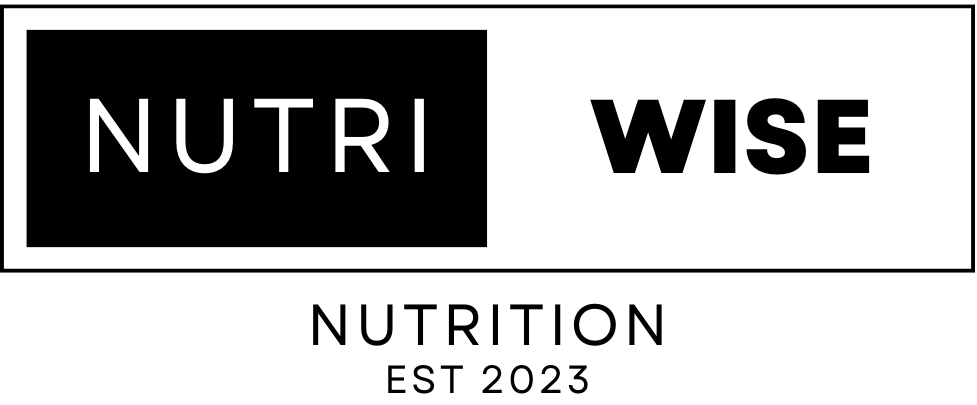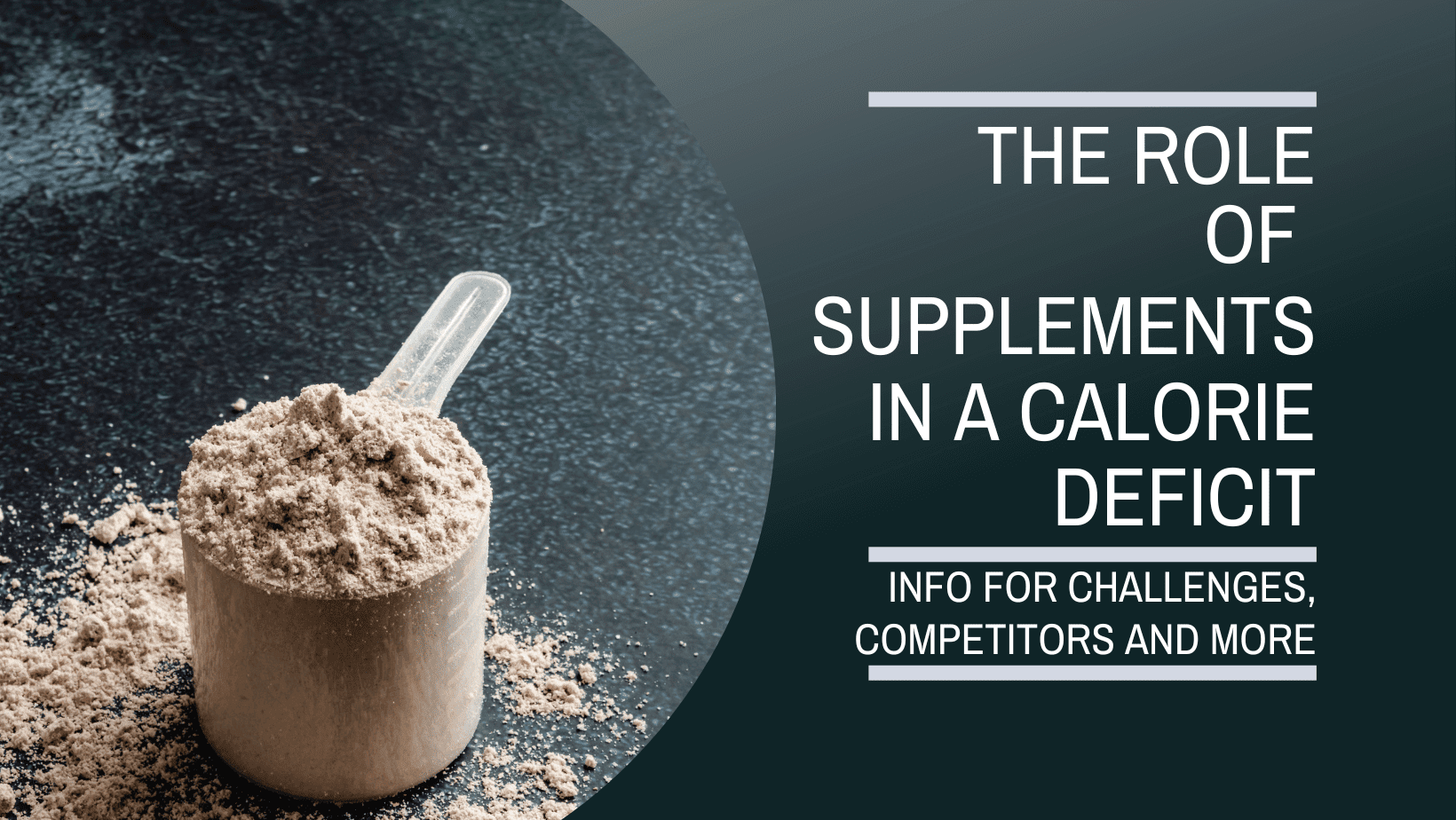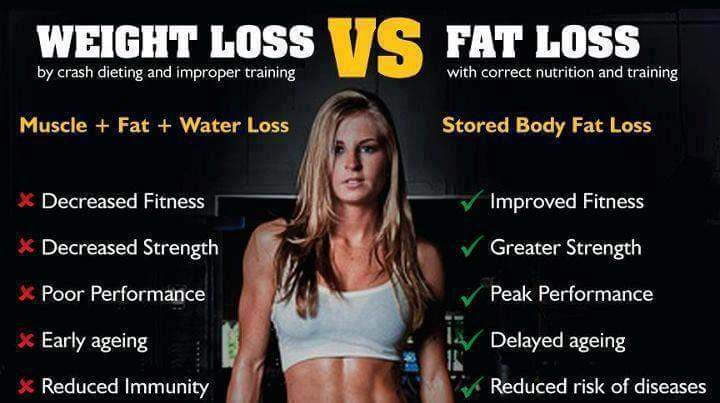The Role of Supplements in a Calorie Deficit
There is a lot of misinformation out there about supplements and their role in various stages of dieting. This is especially common among those participating in weight loss challenges or who are relatively new to the gym. Supplements exist because it’s difficult to ensure you get adequate amounts of vitamins, minerals and nutrients in your diet without implementing some form of meal plan designed to cover all bases. Many would consider that extremely inconvenient to design (or have designed) and implement.
There are nutritional gaps in everyone’s diet. A common statistic I like to use is that it is estimated 80% of the worlds population is magnesium deficient. Whilst it’s true that 80% of the world’s population are not entering into body transformation challenges or competing in bodybuilding competitions, this raises the question “What could you be deficient in without even knowing it?”, especially when you’re restricting the amount of food entering your body.
When restricting the amount of food coming in to your bodies one should always prioritise whole food sources of nutrients over processed alternatives and supplements. This helps keep you satiated and maintains our health in a number of ways. The role of supplements is to bridge the gap between what we are able to eat in a calorie deficit and the nutrients we need to ensure we can achieve the goal – whether that’s fat loss, muscle gain or both.
In this article we’ll be going on a deep dive into the role of supplements in a calorie deficit in order to arm transformation challengers, weight loss warriors, first time gym-goers and competitors alike.
1. Understanding What Supplements Are
Supplements can be an important part of a well-rounded diet. They provide people with essential nutrients that they may not be getting enough of from the foods they eat. But before you start taking any type of supplement, it’s important to understand what they are and how to use them properly.
Supplements come in many forms, including pills, powders, capsules, bars, and more. Depending on the type of supplement you choose, it will contain different amounts of vitamins, minerals, probiotics, proteins, or other substances. Some supplements may also contain herbs or other natural ingredients. It’s important to look past the marketing and read the label in order to find out what it’s supposed to do. If it’s not clear it’s probably not right for you.
When considering if a supplement is right for you it’s commonly advised to consult your doctor first for advice. If your doctor is well versed in nutrition (which not a lot are) they can help you determine which type of supplement might work best for your individual needs based on your lifestyle and specific health concerns. They can also make sure that any supplement you take won’t interact negatively with any medications or existing conditions you may have.
If you don’t have any such person to turn to and want to know more about whether a supplement may be right for you, don’t hesitate to ask us.
Using supplements as part of a healthy diet plan can help ensure that you’re getting all the key nutrients your body needs to stay healthy and strong. However, it’s essential to remember that supplements should never replace whole foods like fruits and vegetables as the primary source of nutrition in your diet.
As mentioned earlier, when you restrict the amount of food you consume it is likely that deficiencies will occur. Choosing the right supplements to compliment your goal is the key to ensuring you’re able to stick to caloric requirements whilst still meeting your nutritional needs.
2. Identifying Your Specific Nutritional Needs
The second step in learning how to use supplements in a calorie deficit is to identify your specific nutritional needs. To do this, you’ll need to review your diet and lifestyle habits in the context of your goal. Consider the foods you eat as part of your competition prep or meal plan provided by your gym, coach or trainer and map out a week’s worth of food intake. Doing this will help you determine if there are any obvious deficiencies in your current nutrition plan that could be addressed with supplementation.
Once you know where you stand in terms of nutritional needs, it’s time to consider what kind of nutrition supplement would be best for you. It’s important to look at ingredients carefully, as well as dosage recommendations so that you don’t overdo it on certain nutrients. One example may be that the provided plan does not include much red meat. This could lead to deficiencies in B-Vitamins, Iron and also protein. If red meat is too calorie dense to be easily included in the plan a protein powder and multi-vitamin can be beneficial to prevent muscle atrophy and iron deficiencies from occurring.
When it comes to supplements, it’s important to remember that they can’t replace healthy eating or physical activity, but they can help to amplify the effects of both. Supplements should be used to fill in any gaps in the diet and should not be relied on as the sole source of nutrition. With the right guidance and information about nutritional needs and supplements, however, it is possible for people to achieve optimal health through proper supplementation.
3. Assessing The Quality Of Nutrition Supplements
Once you’ve identified your specific nutritional needs, the next step is to assess the quality of the supplements you have access to. This is important because not all supplements are created equal and you want to make sure you get what you pay for. It’s critical to know the source of the supplement and if it has been tested for safety and efficacy.
This is where we make a point of checking labels and ensuring that the supplement you’re taking has been tested. If you’re competing in a drug tested bodybuilding federation you’ll surely want to have the highest quality supplements instead of something with questionable origins.
When looking at a supplement, take a closer look at its label and contents. Pay attention to ingredients like fillers, binders, excipients, dyes, and other additives that can be found in lower-quality products. Avoid any products that have not been third party tested or produced in a GMP facility if you’re a drug tested competitor. It may also be beneficial to research reviews from other customers who have tried the product before making your purchase decision or consulting Global DRO for information about specific substances or compounds.
Consult a professional in the nutrition space if you’re unsure about how much to take. They can give you personalized advice on which type of supplement would best suit your needs as well as how much of it you should take daily or weekly based on your individual dietary habits.
4. Knowing When To Take Supplements
When it comes to taking supplements, timing is the key to maximising the benefits. This is especially true when in a calorie deficit due to the gaps they fill in your diet. Knowing when to take them can be the difference between success and failure when it comes to the end goal. Taking them at the right time can help ensure you get the most out of their benefits.
Let’s take a look at how to properly time the intake of various supplements.
Most supplements will tell you on the label with some instructions when to take them. Some assume you know when to take them and just give you instructions on how to mix them if they’re powders. First and foremost, consult the label.
Timing depends on the type of supplement you’re taking. For instance, if you’re taking a pre-workout supplement, then it’s important to take it before your workout so that you receive the maximum benefit from its ingredients. On the other hand, if you’re taking a post-workout supplement such as protein powder, then it’s best to take it after your workout to help support muscle recovery and growth.
| Category | Ideal Timing |
|---|---|
| General Health | Morning |
| Protein | Post Workout & Any other time of day |
| Pre-Workout or Energy Compounds | Before Training |
| Creatine | Post Workout |
| Sleep Formula (zinc & magnesium, ashwaganda | Prior to bed |
| Hormone Support (testosterone boosters, estrogen suppressors, regulators or amplifiers) | Morning & Night |
| Amino’s | During Training |
Finally, keep in mind that some supplements need to be taken with food or water in order for them to be absorbed properly by your body. This is especially true for fat-soluble vitamins such as A, D, E and K which must be accompanied by dietary fat in order for your body to absorb them correctly. Additionally, some supplements are best taken with meals because they can interfere with digestion if taken on an empty stomach whereas others specifically say to take them on an empty stomach and wait to eat after consuming. So make sure you read up on the recommended intake guidelines for any supplement before adding it into your routine.
No matter what type of supplement you are taking or when you are taking it, always remember that consistency is key – this means making sure that you stick with a regular schedule when it comes to taking your nutrition supplements so that you can get the most out of their benefits over time.
5. Choosing The Right Form Of Supplement
When it comes to choosing the right form of nutrition supplement, it’s important to consider your individual needs. Different supplements come in a variety of forms and strengths, so it’s important to determine which one is best for you. For instance, if you require an immediate boost of energy or minerals, taking a drinkable supplement may be the most effective option. On the other hand, some people find that taking tablets or capsules allows for more control over their daily intake. Having control over the daily intake can be a useful tool in a calorie deficit as some powders contain other elements which increase caloric value of the supplement whereas capsules or tablets will simply be the advertised nutrient.
It’s also important to understand what ingredients are in the supplements you choose. Some products contain multiple nutrients designed to compliment each other for a specific goal, while others focus on just one or two. Additionally, there are natural and artificial forms of many ingredients but this usually doesn’t make much of a difference unless you’re looking for the natural version to fill a specific need.
6. Exploring Different Types Of Supplements
When it comes to exploring different types of nutrition supplements, there’s a lot to consider. Pills and capsules are the most popular form of nutrition, and they tend to be easy to take on a daily basis. They offer convenience for those who don’t like taking liquid supplements or who don’t have time for complicated preparation methods. The downside is that pill-and-capsule-based supplements often contain fillers that reduce the potency of the nutrients.
In contrast, powdered forms offer higher levels of bioavailability as well as more flexibility in terms of dosage control. They’re also great for people with dietary restrictions since many powdered supplements are designed to be vegan or vegetarian friendly. On the other hand, powder form supplements may not be as convenient if you can’t pre-make them or don’t have access to a blender, liquid or a shaker bottle.
Last but not least, we have liquid forms which absorb quickly into your system due to their small particle size. They’re also generally easier on sensitive stomachs than pills or powders since they’re less concentrated. These are generally referred to as RTD’s (Ready To Drink) and are a great option for those without liquids to mix their supplements with whilst out.
No matter which type of supplement you choose, it’s important to think about the form of supplement you elect to take so that you know exactly what you’re getting out of it and how it will fit into your lifestyle and diet plan.
7. Understanding Supplement Ingredients
Once you’ve explored the different types of nutrition supplements available, it’s time to take a closer look at the individual ingredients in each supplement. You’ll want to know exactly what you’re putting into your body when taking any type of supplement.
One way to research supplement ingredients is by reading online reviews and articles. This will give you information such as potential side effects, recommended dosages, and the potential down sides of the product. Additionally, you can check out the manufacturer’s website for more detailed information on their products.
It’s important to do your due diligence when researching supplement ingredients, especially when you’re undertaking a fitness challenge or competition prep phase. The more informed you are about what you’re taking, the better off you’ll be in terms of achieving the end goal. Understanding the calorie and macro-nutrient breakdown of supplements such as protein powder is essential. You do not want to accidentally consume extra calories and throw out your meal plan.
8. Storing And Preparing Supplements
When it comes to supplements, storage and preparation is essential. Storing and preparing the supplements correctly can help ensure that they are safe and effective for use. For instance, if a supplement requires refrigeration, it should be kept in the refrigerator until the time of use. Additionally, some supplements may need to be storing them at an appropriate temperature and humidity level.
Ensuring that vitamins are not kept in direct sunlight keep all bottles sealed tightly when not in use to protect against moisture and contamination will ensure that you do not lower the potency of the product. Many products contain a silica bag designed to absorb moisture from the atmosphere that enters the container. If your storage location is excessively humid these will not protect the contents and you may find that powders clump together and get extremely hard or capsules stick together. If this occurs the product is spoiled and should be thrown away.
It’s also wise to monitor expiration dates on nutrition supplement labels closely. When a supplement reaches its expiration date, its effectiveness may start to decrease significantly or it may even become unsafe for consumption. This is why you should always dispose of expired supplements responsibly rather than trying to extend their usability past the date listed on the package.
9. Monitoring Your Response To Supplements
Monitoring your response to nutrition supplements is an important step in ensuring you’re taking the right supplement for your body and getting the most out of them. As mentioned numerous times in this article, a caloric deficit restricts the nutrients in our diet and supplements are filling the gap created. Should you notice the gap is not being appropriately filled you may need to increase your supplementation.
Similarly, many people rely on stimulants to combat the feeling of a lack of energy when dieting. In principal this pick me up is fine, however, dependency on it to function throughout the day is a problem. Excessive stimulant use causes problems with sleep and cortisol regulation which compounds the problem.
When you begin using supplements, try to make note of your baseline and any changes from it in a note on your phone or journal if you have one. Make sure that you record information such as what supplements you took, when you took it, how much, and any changes that occurred after taking it. Pay attention to both positive and negative changes – if the supplement seems to help with a certain symptom, this is useful information; however, if the supplement causes an adverse reaction or does not bring about the desired effect, this is also important data for managing your health.
For example, many people find that during a severe caloric restriction their nails weaken and hair becomes brittle or damages easily – this is normal, however supplementing with collagen can assist to prevent this worsening and offers the body a resource to repair the damage with.
It is also beneficial to discuss any supplement use with your coach so they can provide additional guidance as needed. If you have a managed health condition your doctor may want to monitor certain aspects of your health more closely while introducing new supplements into your diet. Additionally, they may suggest other types of supplements or lifestyle modifications that could help improve your overall health. Monitoring your responses on an ongoing basis is key to staying healthy while using supplements and ensures you are not wasting your money.
10. Consult A Professional
It is important to understand that supplements are not a one-size-fits-all solution. Everyone’s body chemistry is different and responds to different things in different ways. This means that monitoring your response to supplements is essential for getting the most out of them. Now, let’s look at the next step in this guide: consulting with a professional.
Consulting with a professional in the field such as us, can be extremely beneficial when it comes to using supplements effectively. A professional in this field can help you find the right balance of nutrients and recommend specific supplement combinations tailored to your individual needs. Not only that, but they can also provide valuable guidance on how best to incorporate those supplements into your lifestyle so you get maximum benefit from them.
It is also important to feel comfortable communicating with them and asking questions so you understand their recommendations fully. With the right expert advice, you can ensure that your nutrition is on point and your supplement use is safe, effective, and tailored to you personally. We offer a no judgement, no BS approach to your supplement use.
By taking these steps and following this guide carefully, you should be well on your way towards getting the most out of your nutrition supplement use. So take your time, do some research, and consult with an expert before making any decisions about which supplements are right for you.
Frequently Asked Questions
Are Supplements Safe To Take?
Supplements can provide us with the essential vitamins, minerals and nutrients that our bodies need to stay healthy. But when it comes to taking them, many of us are left wondering: Are nutrition supplements safe to take?
The answer is, yes – if taken correctly. Supplements are generally safe for most people when taken in accordance with the recommended dosage guidelines. However, certain individuals may be more vulnerable to adverse effects due to their age or existing health conditions. It’s important to consult your doctor before taking any supplement, especially if you have a pre-existing medical condition or are pregnant.
In addition, some supplements may interact with prescribed medications or other substances so it’s important to speak with your doctor about potential drug interactions if you have an ongoing prescription or are taking any other drugs. Furthermore, some supplements can be dangerous when taken in high doses or in combination with other substances, such as alcohol or caffeine. Remember that even natural ingredients and herbal products may cause side effects if used incorrectly.
It is also worth noting that not all supplements are created equal – some may contain unlisted ingredients or contaminants that could be unsafe for human consumption. This is why we don’t stock everything under the sun. Make sure to buy reputable brands and always read the label carefully before taking any supplement!
Can I Take Too Many Supplements?
When it comes to nutrition supplements, you may be wondering if taking too many could have any negative consequences. The answer is yes – taking more than the recommended dose of a supplement can be dangerous and even lead to serious health issues. To ensure you’re getting the right amount, it’s important to follow instructions on the label.
No matter what kind of supplement you’re taking, it’s always best to stick with the recommended dosage. Overdosing on certain vitamins and minerals can cause side effects such as nausea, vomiting, abdominal pain, fatigue, and even changes in heart rate or blood pressure. If you accidentally take too much of one type of supplement, contact your doctor or pharmacist for advice on how to proceed.
For example, a magnesium overdose is usually benign, but causes diarrhoea as when it passes through the digestive system it draws water to the colon as the body attempts to flush it out. This is commonly used in laxatives and diuretics. Other ingredients such as caffeine can have a much more severe effect when consuming too much, such as an inability to prevent your heart from racing which can land you in hospital.
It’s also important to remember that just because something is labeled as “natural” doesn’t mean it is completely safe. Natural supplements are still compounds that have toxicity levels, so they should be treated with caution – just like any other substance. Before taking any type of supplement, make sure to read all warning labels carefully and speak with your doctor or pharmacist about potential interactions with other medications or supplements you may already be taking.
With proper use and guidance supplements can help support optimal health – but only if taken in the correct amounts. It’s important to remember that too much of anything can be harmful and that moderation is key when it comes to your health and well-being.
What Are The Possible Side Effects Of Taking Supplements?
Nutrition supplements are a great way to get the vitamins and minerals your body needs. However, taking too many of these can have serious consequences for your health. Before you decide to take any nutrition supplement, it’s important to know what the potential side effects could be.
One of the most common side effects associated with taking nutrition supplements is upset stomach or nausea. This can be caused by taking too much of a particular vitamin or mineral, or by not allowing enough time between doses. Other possible side effects include headaches, dizziness, and fatigue. In rare cases, more serious reactions such as an allergic reaction may occur.
It’s important to speak with your doctor before starting any supplement regimen and make sure you are aware of how much you are taking and how often. Different people react differently to supplements, so it’s important that you monitor your own reactions carefully if you decide to take them.
Always read the label on the supplement bottle carefully and don’t exceed the recommended dosage. Taking too much can lead to adverse reactions that could potentially be dangerous for your health. If you experience any negative side effects from taking a nutrition supplement, stop immediately and contact your doctor for further advice.
How Long Should I Take A Supplements For?
The short answer – as long as you need to.
The length of time needed to take supplements varies depending on the type of supplement and its purpose. For example, if you’re taking a multivitamin as part of a general wellness plan, you may only need to take it for a few weeks or months. On the other hand, if you’re using a specific supplement to address a specific health issue induced by a gap in your diet, like protein powder because you’re vegan, it might be necessary to continue taking it for an extended period of time.
When you’re in a calorie deficit with a specific goal in mind you would likely stop once the goal has been achieved – such as upon completion of your bodybuilding show or conclusion of a transformation challenge.
It’s important to note that there are certain factors that will affect how long you should take any given supplement, such as your age, diet, lifestyle and medical history. This means that what works for one person may not be needed for another.
Are There Any Interactions Between Supplements And Other Medications?
When it comes to taking nutrition supplements, it’s important to understand how they interact with any other medications you’re taking. It’s possible that combining certain supplements and drugs could cause serious side effects or even be deadly. To ensure your safety, it’s essential to consult with a doctor before beginning any supplement program.
Before starting any new supplement regimen, make sure to go over all the medications you are currently taking with your doctor. Discussing potential interactions between medicines and supplements is an important step in keeping yourself healthy. Be sure to include all over-the-counter drugs as well as vitamins and herbal products in your discussion with your doctor.
If your doctor suggests avoiding any particular combinations of medication and supplements, make sure to pay close attention and follow their advice. Additionally, inform them of any changes in medication or supplement use so they can monitor potential interactions more closely. By doing this, you’ll ensure that you get the most out of both your nutrition supplements and medications while staying safe at the same time. Taking steps to understand how different substances interact will help keep you healthier in the long run.
Can I Use Supplements Whilst Pregnant or Breastfeeding?
It’s common for doctors to advise against taking many supplements whilst pregnant or breastfeeding in the same manner they will advise against eating soft cheeses and rare red meats. This is to limit the amount of foreign chemicals or bacteria that enters the body which could be passed on to your baby.
Some intelligence needs to be used here. Many women are unable to consume adequate amounts of protein whilst they are pregnant and even struggle to maintain a healthy amount of calories due to nausea and decreased stomach capacity. There is a role that supplements play in this scenario.
As always, consult with your doctor on an approach that suits your specific needs. Generally, there is no problem with consuming supplements whilst pregnant or breastfeeding, you should be extremely picky about which one you take. A good indicator is whether the product is produced in a GMP facility and is HPLC or third party tested for quality.
If your doctor advises against consuming particular supplements then follow their advice. Always keep them informed of your dietary practices during the course of the pregnancy and afterward whilst breastfeeding.
Conclusion
In conclusion, supplements can be a great way to bridge gaps your diet and help you reach your health goals. However, it is important to remember that they should always be taken with caution. Always consult with your doctor before taking any type of supplement if you are unsure of its benefits, as it could interact with other medications you are taking or cause side effects that could be harmful to your health.
Additionally, make sure not to take too many supplements at once or to rely on them for long of a period of time; this could also lead to negative health consequences. By following these simple guidelines, you can safely and effectively use supplements to improve your body composition, health and wellbeing whilst achieving your goals.










